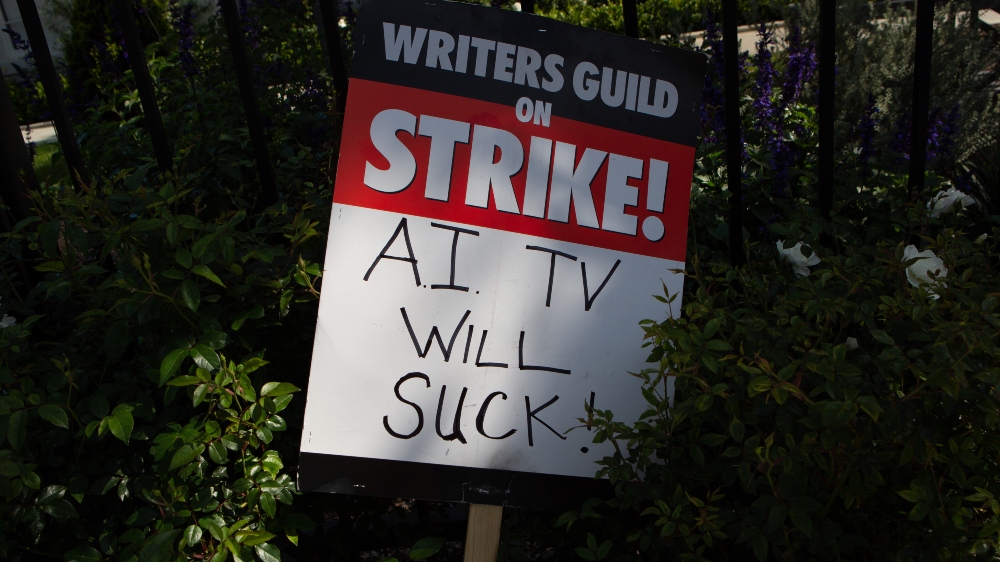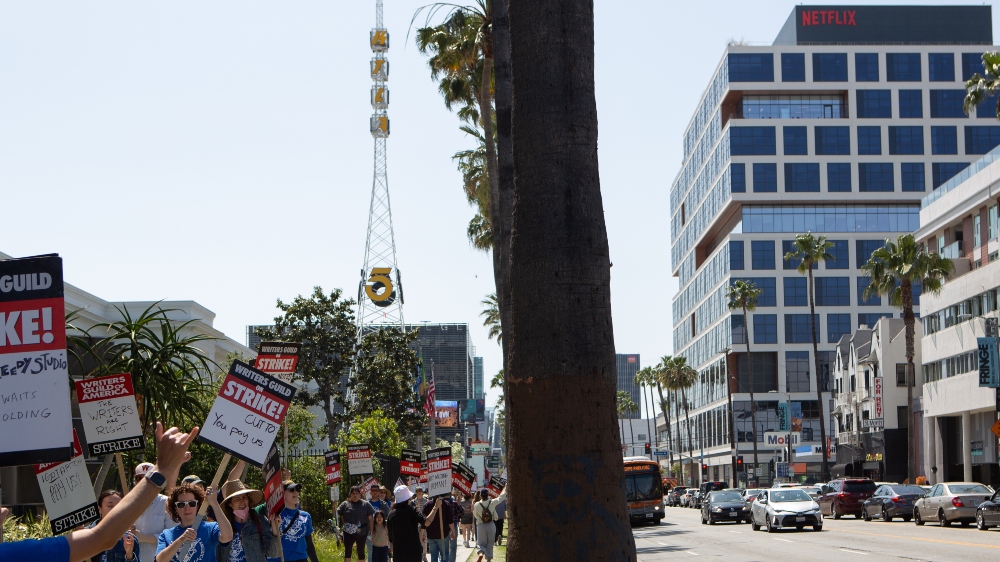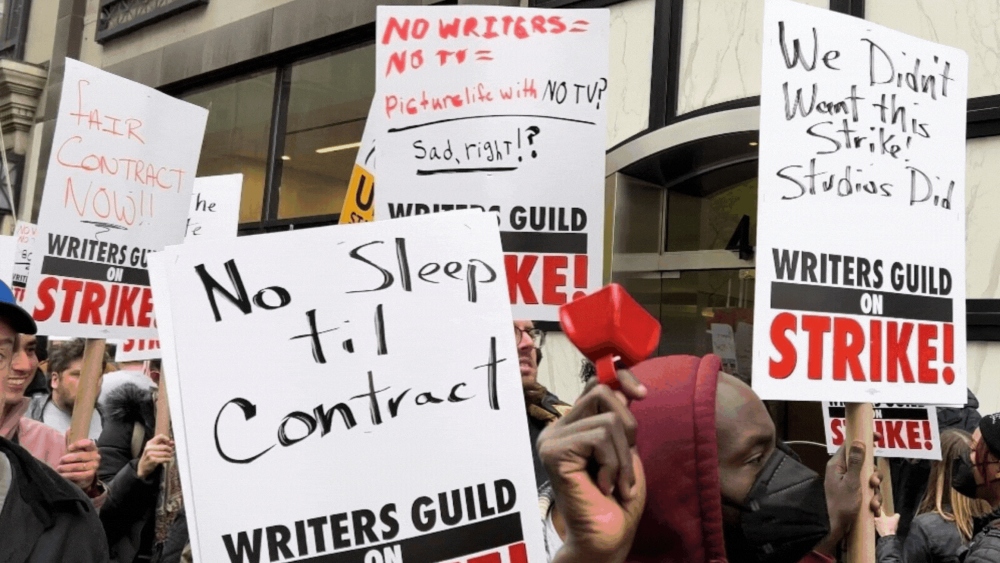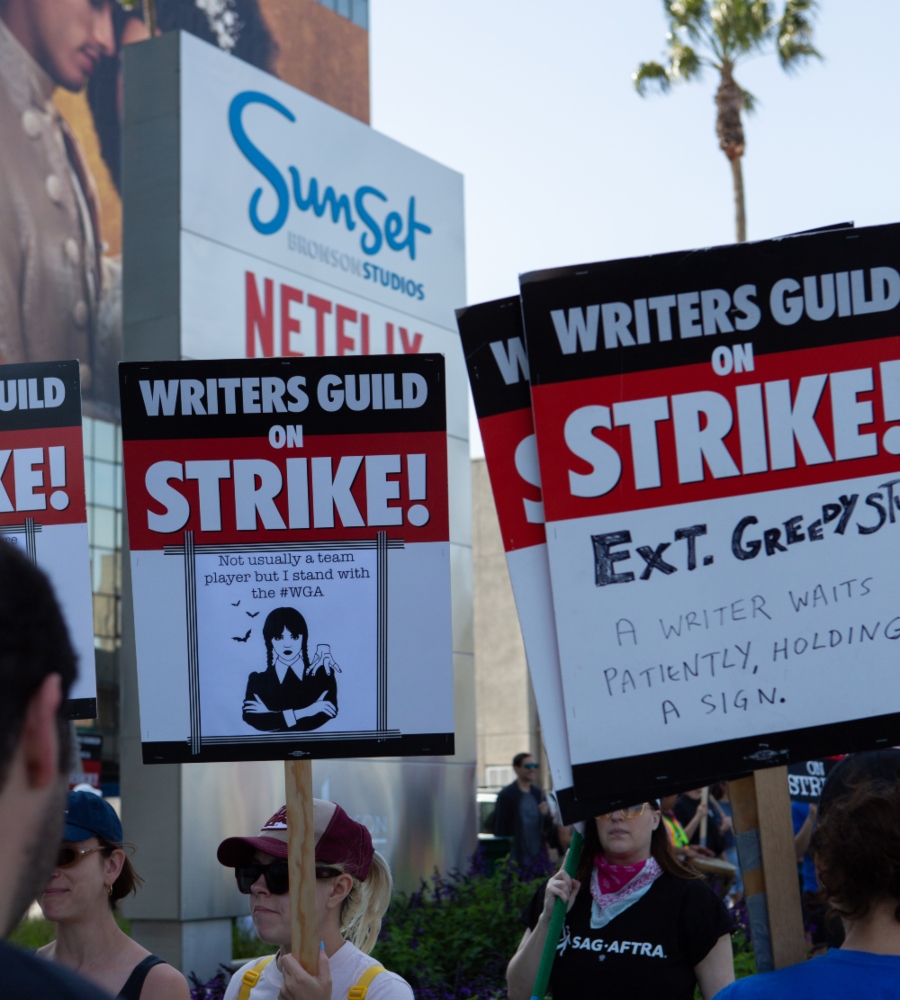“There are clear parallels between the concerns at the heart of the writers’ strike and other looming worker actions around the country. At the heart of the WGA’s complaints is that a shift in strategy towards streaming content from studios has turned writers into gig workers with no job security — an issue that also has implications for the 340,000 or so workers at UPS whose contract is up later this year.”
You might think that statement is from a union organizer, perhaps one outside of Hollywood, talking about the commonality that current labor struggles all have with each other, even in professions where doing exceptionally well still doesn’t get you an Emmy or Oscar nomination… but it’s not.
Surprisingly, it’s from Politico, that inside-the-beltway publication known for its fairly conventional wisdom. It comes in an article headlined Why the writers strike is about much more than Hollywood, and goes on to mention that you’d be forgiven if these also “sound like problems ripe for discussion at a dinner party in Silver Lake […] but setting aside the Hollywood specifics, the issue of the gig economy is roiling unions around the country.”
And of course, there is more reportage in general on this Hollywood strike than any other showbiz shutdown in history — from hashtags to podcasts to bespoke newsletters on Substack and Medium, Instagram feeds, Mastodon accounts, ongoing roundups of well-written picket signs, and numerous columns and articles (mea culpa!) not only all over the entertainment sphere, as might be expected, but across most of the media.

Overlapping issues, like the role of AI, and the inevitable displacements it will bring in workforces everywhere, help broaden the coverage further. Wired just ran a piece declaring that Hollywood’s Screenwriters Are Right To Fear AI, noting that it’s not just the WGA, but “artists, actors, musicians — people in all creative professions — are trying to wrest control of the technology before it is used against them. It’s a smart move. If the history of automation has demonstrated anything, it’s that leaving the implementation of new technologies up to management is a bad idea.”
Indeed, the history of labor in America, and elsewhere, tends to indicate that management is primarily comprised of bad ideas, and this is borne out in a quote in the article from the upcoming Power and Progress: Our Thousand-Year Struggle Over Technology and Prosperity, from MIT economists Daron Acemoglu and Simon Johnson which “chronicles a thousand years of elites — from European nobles in the Middle Ages to modern-day tech CEOs — gaining from technological advancements at the expense of workers. Generative AI fits neatly into this historical context.”
With so much then apparently — existentially — at stake not just for Hollywood workers, but workers in general, you might think that labor would be picking up the baton, or sharing it, with the WGA, in a way they normally wouldn’t when the issues were solely arbitrating credits, or residual percentages — concepts absent from most other workplaces. Particularly since folks working outside professional sports or the above-the-line corridors of power in Hollywood have little leverage to ask for such things, or to stay remunerated for things they helped create.
If you looked at reports on the multi-union rally held at the outset of the strike down at the Shrine Auditorium, which used to host the Oscars, the seeds of a potential coalition would seem to be planted. Local Teamster 399 chief — the youngest ever to run that local — Lindsay Dougherty went viral for excoriating studios and preaching solidarity, saying, among many other things, “We are at a turning point in the labor movement right now. If we want to get what’s ours, we’re gonna have to fight for it tooth and nail. So just hang in there. Keep fighting. Keep hitting the pavement every single day, because if you throw up a picket line, these fucking trucks will stop, I promise you.”

And they have, particularly for shows filming in East Coast locations and facilities, such as Marvel’s recently revived — and more recently shut down — Daredevil: Born Again, among an ever-expanding list of others.
And yet, while there is no end to general media reporting on Hollywood, labor sites themselves have been a bit slower on the uptake.
A look at the Teamsters’ national site for example, currently brings front-page stories on the aforementioned UPS drivers that Politico referred to, along with their colleagues at Amazon and DHS, who are also striving to be more than “gig workers,” along with information on recently passed bills, and other, smaller victories, struggles, gatherings, etc. Nothing about the need to confront multinational media conglomerates, however.
Similarly, Labor Notes, a site for rank-and-file activists willing to be less polite than mainstream union tactics might always allow for, has a front-page story on Starbucks workers, whose jobs will also surely be threatened by inevitable, AI-driven “automat” style coffee shops, for greater “efficiency.”
On the other hand, the AFL-CIO main page, which for most of the week had stories on getting Biden labor secretary nominee Julie Su past the usual GOP roadblocks and into her cabinet position, has, just since the original drafting of this column, begun a featuring a petition letting you Say You Stand With Striking Writers.

“Studios,” the labor organization goes on to explain, “have used the transition to streaming to cut writer pay and separate writing from production, worsening working conditions for writers at all levels. Say you support the striking workers and think they should get a fair deal.”
When you click through, you can add your name and e-dress. As of this writing, the petition page declares that “9,703 Actions” have been taken so far, with “only 3,097 more until our goal of 12,800.”
It is unclear what happens when 12,800 is reached, though signees can get updates, likely letting them know that Netflix, and other AMPTP members, remain unmoved — something already anticipated in language from an earlier AFL-CIO press release, also linked at the national site. That said, in part, “writers are the lifeblood of film, television, and other entertainment, and they deserve a fair contract that ensures these vital jobs pay family-supporting wages and include decent benefits like health care and retirement. Producers make billions in profits off the words that bring the magic of film and television to life for audiences in the United States and around the world. It’s deeply disappointing that the Alliance of Motion Picture and Television Producers (AMPTP) isn’t bargaining in good faith to deliver a fair contract.”
All of which is fine, but where is that presumably expanding support actually headed?

Hollywood itself isn’t even entirely solidified, or shutdown — at least not yet (though in our next column, we’ll be touching on the increasing shuttering of Emmy-season FYC events, and even ways the strike is percolating into other aspects like scriptwriting contests).
And of course, union members in one kind of industry don’t walk off their job because somebody somewhere else has. Not only because it would be hard for workers to afford in nearly every case, but because that would also be a “general strike.” And older labor groups, like the Wobblies, used to get framed for murder — or worse — for suggesting such things.
So, despite certain similar themes — the hoarding of corporate profits, the oncoming AI engine promising more dislocation — America’s workers, whether in a mini-writers’ room or driving for UPS or serving up mochas down at the corner, are, so far — to paraphrase a certain renowned non-Guild writer — “unhappy in their own way.”
Though there are indications that the suffering will be, increasingly, shared. Which might make things very interesting indeed for the AMPTP. And the parent companies of its members.
So even if Hollywood’s own above and below-the-line workers aren’t quite all on the same page yet, certainly, if the strike stretches into autumn, we’ll be getting quite the gripping third-act developments.
 Mark London Williams is a BTL alum who currently covers Hollywood and its contents and discontents in his recurring “Across the Pond” dispatch for British Cinematographer magazine, contributes to other showbiz and production-minded sites, and musters out the occasional zombie, pandemic-themed, or demon-tinged book and script, causing an increased blurring in terms of what still feels like “fiction.”
Mark London Williams is a BTL alum who currently covers Hollywood and its contents and discontents in his recurring “Across the Pond” dispatch for British Cinematographer magazine, contributes to other showbiz and production-minded sites, and musters out the occasional zombie, pandemic-themed, or demon-tinged book and script, causing an increased blurring in terms of what still feels like “fiction.”
Mark’s Union Roundup column will appear regularly, and he welcomes both tips and feedback at [email protected]. He can also be found on Twitter @TricksterInk.





